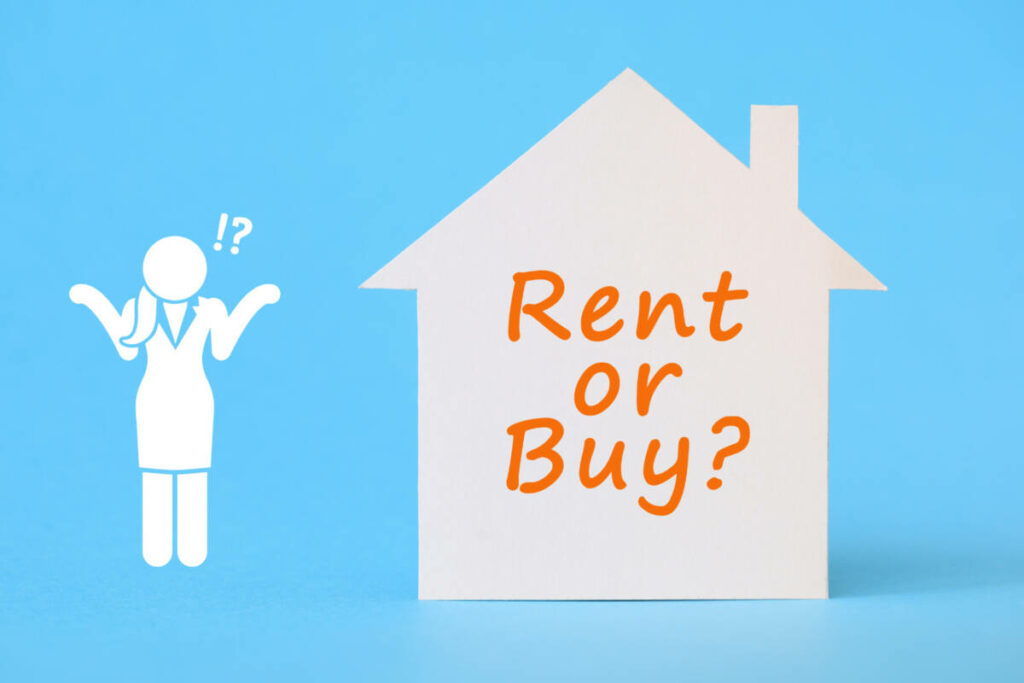Renting vs. Buying – Which Is Better?
Renting vs. Buying – Which Is Better?
One of the biggest financial decisions many faces is whether to rent or buy a home. Both options have advantages and disadvantages, and it can be challenging to determine which is better for your specific situation. In this blog post, we will explore the pros and cons of renting and buying a home and provide examples to help you make an informed decision.
Renting
Advantages
Flexibility: One of the most significant advantages of renting is flexibility. You can easily move from one location to another without worrying about selling your home. This can be especially useful for people who frequently move for work or other reasons.
Lower Upfront Costs: Renting typically requires a smaller upfront investment than buying. You will normally only need to pay a security deposit and the first month’s rent, whereas buying a home requires a down payment and other closing costs.
Fewer Maintenance Responsibilities: When you rent, the landlord is responsible for most of the maintenance and repairs to the property. This can save you time and money on repairs and maintenance.
Disadvantages
Lack of Equity: When you rent, you pay someone else’s mortgage. You are not building equity in the property, which can be a disadvantage in the long run.
Limited Control: As a renter, you have limited control over the property. You may be unable to make changes or improvements without the landlord’s permission.
Rent Increases: Rent prices can increase over time, making it difficult to budget for housing costs.
Example: You are a recent college graduate who has just landed a job in a new city. You are not sure how long you will be living in the area, and you do not have a lot of savings. Renting a small apartment would be a good choice because it is more flexible, requires a smaller upfront investment, and you will not be responsible for major maintenance costs.
Buying
Advantages
Building Equity: Buying a home allows you to build equity in the property. Over time, your home may increase in value, allowing you to make a profit when you sell it.
Control: When you own a home, you have more control over the property. You can make changes and improvements as you see fit without getting permission from a landlord.
Stability: Buying a home provides strength and a sense of security. You do not have to worry about rent increases or a landlord selling the property.
Disadvantages
Upfront Costs: Buying a home requires a significant upfront investment, including down payment and closing costs.
Maintenance Costs: As a homeowner, you are responsible for all maintenance and repairs to the property. This can be costly and time-consuming.
Less Flexibility: Buying a home is a long-term commitment, and moving can be challenging if you need to relocate.
Example: You are a married couple with two children and plan on living in the same area for the foreseeable future. You have saved up for a down payment and want to invest in a property that will build equity over time. A home would be a good choice because it provides stability, control over the property, and the opportunity to build equity.
Homeownership
Homeownership is often seen as a milestone in achieving the American Dream. There are many benefits to owning a home, both financially and personally. In this blog post, we will explore the advantages of homeownership and provide examples of how owning a home can be a smart investment.
Building Equity
One of the most significant benefits of homeownership is building equity. Equity is the difference between the value of your home and the amount of money you owe on your mortgage. As you pay off your mortgage, your equity grows, and you can use it to finance other investments or to pay for major expenses.
Example: You buy a home for $300,000 with a 20% down payment of $60,000. Your mortgage is $240,000. After ten years of making payments, your mortgage balance is $180,000, and your home has appreciated to $400,000. Your equity in the house is $220,000 ($400,000 – $180,000).
Tax Benefits
Homeownership comes with several tax benefits, including deducting mortgage interest and property taxes on your income taxes. These deductions can reduce your overall tax liability and increase your disposable income.
Example: You own a home with a mortgage of $250,000. Your annual mortgage interest is $12,000, and your property taxes are $5,000. You can deduct the full amount of your mortgage interest and property taxes from your income taxes, reducing your taxable income by $17,000.
Personalization
As a homeowner, you can personalize and make changes to your home to suit your tastes and lifestyle. You can paint the walls, install new flooring, or remodel the kitchen without getting permission from a landlord.
Example: You buy a home with outdated décor and an old kitchen. You can remodel the kitchen and update the décor to your liking, improving the home’s overall value and making it more enjoyable.
Stability
Owning a home provides stability and a sense of security. You do not have to worry about rent increases or a landlord selling the property. You can settle into your community and establish roots.
Example: You buy a home in a desirable neighborhood with excellent schools and amenities. You can raise your family sustainably and build relationships with your neighbors and community.
Appreciation
Over time, homes generally appreciate, providing a significant return on investment when you sell. Historically, home values have increased more than inflation, making homeownership a smart long-term investment.
Example: You buy a home for $400,000, and after ten years, it has appreciated to $600,000. When you sell the house, you profit $200,000, providing a significant return on investment.
Conclusion
Homeownership provides many benefits, including building equity, tax benefits, personalization, stability, and appreciation. It is essential to consider your financial situation and long-term goals when deciding whether to buy a home. Homeownership is a smart investment for those who are financially prepared and ready for the responsibilities of owning a home.
To learn more details, let’s talk with Amar REALTOR®.
Let’s schedule a meeting with Amar REALTOR to review all your Real Estate objectives at a time that works for you.
 Please Click the link below to schedule a time on my online calendar!
Please Click the link below to schedule a time on my online calendar!
https://www.amarrealtor.com/meetingwithamarrealtor/
Contact Amar REALTOR® today for more information about Buying/Selling a Home in the Bay Area!
Amar REALTOR® offers expert real estate services with proven results in Bay Area Housing Market, including Homes for sale in Santa Clara County, San Mateo County, Contra Costa County, and Alameda County.
More Interesting Information about Bay-Area Real Estate
First-Time Homebuyers: Buying A Historic Home Here’s What You’ll Need To Know?
First-Time Homebuyers: All About Foreclosures
First-Time Homebuyers: Is Buying A Fixer-Upper Worth It?
Common Mistakes People Make When Selling Their Homes
First-Time Homebuyers: Types Of Mortgages
The Risks of Unlicensed Contractors
First-Time Homebuyers: What You Need To Know Before Relocating?
